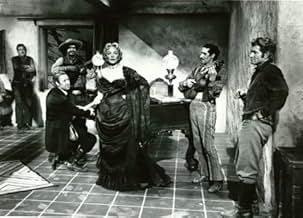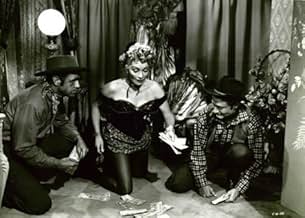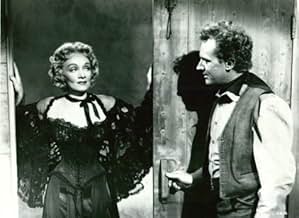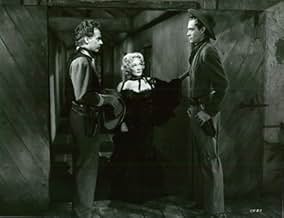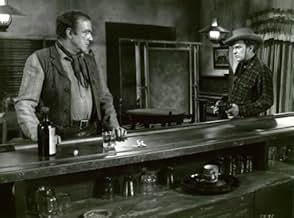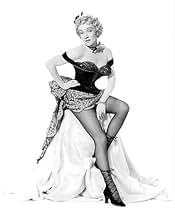ÉVALUATION IMDb
6,8/10
5,9 k
MA NOTE
Après le meurtre de sa fiancée, un cowboy du Wyoming part à la recherche de son assassin.Après le meurtre de sa fiancée, un cowboy du Wyoming part à la recherche de son assassin.Après le meurtre de sa fiancée, un cowboy du Wyoming part à la recherche de son assassin.
- Director
- Writers
- Stars
Rodd Redwing
- Rio
- (as Rodric Redwing)
Victor Adamson
- Racer with Fat Girl
- (uncredited)
Roger Anderson
- Red
- (uncredited)
Al Bain
- Race Spectator
- (uncredited)
Ray Beltram
- Barfly
- (uncredited)
Avis en vedette
In Wyoming , when his sweetheart is murdered , then an embittered cowboy (Arthur Kennedy who was playing a young man , he was actually three years older than Mel Ferrer) hunting enemies and on the trail of his fiancee's murderer . First with a posse, then by himself , to an outlaw hideout ranch called Chuck-a-Luck (it means a gambling game commonly played in saloons in the Southwest) . As he arrives in Rancho Notorious and the main question is the following : to guess the killer in the mansion . Then , he falls for a dance girl , Altar Keane (Marlene Dietrich who sings some songs in his usual style) , ranch owner that is a refuge for thieves and she posing as an upright rancher and horse seller . In the ranch there is a motley group of bandits (Frank Ferguson , William Frawley , Francis McDonald , Jack Elam and George Reeves with a scar on his cheek) led by Frenchy Fairmont (Mel Ferrer) who scheme to rob a bank in Clay Springs city .
This traditional Western contains drama , thrills , rousing action , frontier adventure , shootouts , and exuberant outdoors , though including matte painting images . This vintage epic Western turns out to be a throughly entertaining picture that will appeal to Western fans . It is an interesting flick in which an initial murder triggering off a tale of hatred , vengeance and a triangular love . A ¨period¨ sample'of 50s westerns , but different to common themes . Fine acting and a lot of duels , shots and killings . Medium budget Western for all those who love moody , thoughtful westerns . This is a very good Western by Fritz Lang , he made three , there's only one better than this , and that's ¨The return of Frank James¨ . Good performances for all-star-cast . Nice acting by Marlene Dietrich at her slinkiest , in fact Rancho Notorious is a must for Marlene fans . As Arthur Kennedy as a ranch hand called Vern Haskell who pursues the killers his girlfriend, following the trail to an outlaw's roost . Kennedy holds his twisted expression to great effect as the relentless cowboy hunting a hidden killer . Acceptable Mel Ferrer as Frenchy Fairmont , an outlaw really enamored to Altar and who defends his love .
The film displays a brilliant cinematography in rich Technicolor by expert cameraman Hal Mohr who had previously photographed Marlene Dietrich in Arizona (1939) . In addition , attractive and evocative musical score by Ken Darby , Emil Newman and uncredited Hugo Friedhofer and Arthur Lange ; including some catching western songs . The motion picture produced by Howard Welsch and RKO was tight as well as seethingly directed by Fritz Lang with great enthusiasm and in his particular style . This was Lang's third Western , following his favorite ¨The return of Frank James¨ with Henry Fonda and ¨Western Union¨ , a Darryl F Zanuck's 20th Century Fox production about construction of the glamorous ¨Western Union¨ route from Omaha , Nebraska , to Salt Lake City , Utah with Robert Young and Dean Jagger . The German Fritz showed himself a master of the most American of genres . As Lang directed masterfully all kind of genres as Noir cinema as ¨Big heat¨ , ¨Scarlet Street¨ and ¨Beyond a reasonable doubt¨ , Epic as ¨Nibelungs¨, suspense as ¨Secret beyond the door¨ , ¨Clash by night¨ and Lang's trilogy about Nazi time as ¨Cloak and dagger¨, ¨Man hunt¨ and ¨Hangmen also die¨, and of course , Sci-Fi with the classic ¨Metropolis¨. Rating Rancho Notorious : Better than average . Well worth watching .
This traditional Western contains drama , thrills , rousing action , frontier adventure , shootouts , and exuberant outdoors , though including matte painting images . This vintage epic Western turns out to be a throughly entertaining picture that will appeal to Western fans . It is an interesting flick in which an initial murder triggering off a tale of hatred , vengeance and a triangular love . A ¨period¨ sample'of 50s westerns , but different to common themes . Fine acting and a lot of duels , shots and killings . Medium budget Western for all those who love moody , thoughtful westerns . This is a very good Western by Fritz Lang , he made three , there's only one better than this , and that's ¨The return of Frank James¨ . Good performances for all-star-cast . Nice acting by Marlene Dietrich at her slinkiest , in fact Rancho Notorious is a must for Marlene fans . As Arthur Kennedy as a ranch hand called Vern Haskell who pursues the killers his girlfriend, following the trail to an outlaw's roost . Kennedy holds his twisted expression to great effect as the relentless cowboy hunting a hidden killer . Acceptable Mel Ferrer as Frenchy Fairmont , an outlaw really enamored to Altar and who defends his love .
The film displays a brilliant cinematography in rich Technicolor by expert cameraman Hal Mohr who had previously photographed Marlene Dietrich in Arizona (1939) . In addition , attractive and evocative musical score by Ken Darby , Emil Newman and uncredited Hugo Friedhofer and Arthur Lange ; including some catching western songs . The motion picture produced by Howard Welsch and RKO was tight as well as seethingly directed by Fritz Lang with great enthusiasm and in his particular style . This was Lang's third Western , following his favorite ¨The return of Frank James¨ with Henry Fonda and ¨Western Union¨ , a Darryl F Zanuck's 20th Century Fox production about construction of the glamorous ¨Western Union¨ route from Omaha , Nebraska , to Salt Lake City , Utah with Robert Young and Dean Jagger . The German Fritz showed himself a master of the most American of genres . As Lang directed masterfully all kind of genres as Noir cinema as ¨Big heat¨ , ¨Scarlet Street¨ and ¨Beyond a reasonable doubt¨ , Epic as ¨Nibelungs¨, suspense as ¨Secret beyond the door¨ , ¨Clash by night¨ and Lang's trilogy about Nazi time as ¨Cloak and dagger¨, ¨Man hunt¨ and ¨Hangmen also die¨, and of course , Sci-Fi with the classic ¨Metropolis¨. Rating Rancho Notorious : Better than average . Well worth watching .
Chuck-a-Luck is a hole in the wall type ranch where men with prices on their heads hide out and are given protection by Altar Keane (Marlene Dietrich) and her lover Frenchy Fairmont (Mel Ferrer) for ten percent of the loot brought in my the outlaws. Chuck-a-Luck is called Rancho Notorious in the film's title, which does sound somewhat better. Unfortunately a terrible narrative theme, "The Legend of Chuck-a-Luck" used throughout the movie becomes very grating to the ears. The ballad singer William Lee (who is he anyway?) doesn't help the situation. Fortunately the songs chosen for the talented Marlene Dietrich to perform are much better (actually one "Gypsy Davey" is an old British ballad that Woody Guthrie turned into a cowboy song). Her renditions are not quite on the level of her "See What The Boys In The Backroom Will Have" from the western classic "Destry Rides Again" but are still captivating. (Interesting that she played a saloon girl named Frenchy in "Destry" whereas this time her lover is named Frenchy.)
This is one of few so-called adult westerns from the 1950's that actually lives up to that label. The flashback barroom scene where the soiled angels are riding their customers in a drunken mock horse race as jockeys would ride horses shows how fun and games in Old West saloons really took place. The whores are not prima donnas as oft times shown in Hollywood films. Pay particular attention to the gross fat showgirl trying to ride a much smaller client. It is funny and repulsive at the same time. Fritz Lang takes away all window dressing. Even Marlene Dietrich looks much more slutty and rough around the edges than she did in "Destry." Being over a decade older gives even more authenticity to Dietrich's character. She looks like a much older Lola Lola from "Blue Angel."
Mel Ferrer is an actor with a somewhat limited range. In the right role he could shine. His best acting was done in a movie that came out just before this one, "The Brave Bulls." But his second best role is as Frenchy in "Rancho Notorious." He fits his part much better than Arthur Kennedy fits his. Kennedy as a gunslinging rancher is fine but Kennedy the lover takes a suspension of belief, especially as Marlene Dietrich's lover. One can just imagine how he would look in the morning after one night with Altar Keane.
Fritz Lang's direction is spectacular. He captures all the nuances of the characters. His flashback technique at the first of the movie to define Altar Keane's persona is reminiscent of Orson Welles' milestone direction of "Citizen Kane." Then he progresses to an almost film noir western in color. The cinematography is much better in some parts of the film. It is not as effective when Frenchy and Vern (Arthur Kennedy) are together in the hills (the background sometimes looks phony) than when interior sets are used. Perhaps this relates to a money problem producing the show.
Another enjoyable facet of the feature is the gallery of colorful character actors who all do superlative jobs. George Reeves (tv's Superman) is lovingly menacing as a womanizing gun toting ambusher. Jack Elam is fine as a distrustful negative thinking thief. Frank Ferguson plays the outlaw called Preacher who prays and reads from the Bible for special guidance in robbing and killing. William Frawley (better known as Fred Mertz) shows a mean side playing a double dealing saloon gambler who fires Altar. Fuzzy Knight is an honest barber who tries to help Vern out of a mess. This time he doesn't stutter. Several other notables such as Tom London, Kermit Maynard, and Harry Woods have interesting bit parts.
If Lang could have borrowed Tex Ritter from High Noon to do an appropriate theme, "Rancho Notorious" would have been a winner all the way.
This is one of few so-called adult westerns from the 1950's that actually lives up to that label. The flashback barroom scene where the soiled angels are riding their customers in a drunken mock horse race as jockeys would ride horses shows how fun and games in Old West saloons really took place. The whores are not prima donnas as oft times shown in Hollywood films. Pay particular attention to the gross fat showgirl trying to ride a much smaller client. It is funny and repulsive at the same time. Fritz Lang takes away all window dressing. Even Marlene Dietrich looks much more slutty and rough around the edges than she did in "Destry." Being over a decade older gives even more authenticity to Dietrich's character. She looks like a much older Lola Lola from "Blue Angel."
Mel Ferrer is an actor with a somewhat limited range. In the right role he could shine. His best acting was done in a movie that came out just before this one, "The Brave Bulls." But his second best role is as Frenchy in "Rancho Notorious." He fits his part much better than Arthur Kennedy fits his. Kennedy as a gunslinging rancher is fine but Kennedy the lover takes a suspension of belief, especially as Marlene Dietrich's lover. One can just imagine how he would look in the morning after one night with Altar Keane.
Fritz Lang's direction is spectacular. He captures all the nuances of the characters. His flashback technique at the first of the movie to define Altar Keane's persona is reminiscent of Orson Welles' milestone direction of "Citizen Kane." Then he progresses to an almost film noir western in color. The cinematography is much better in some parts of the film. It is not as effective when Frenchy and Vern (Arthur Kennedy) are together in the hills (the background sometimes looks phony) than when interior sets are used. Perhaps this relates to a money problem producing the show.
Another enjoyable facet of the feature is the gallery of colorful character actors who all do superlative jobs. George Reeves (tv's Superman) is lovingly menacing as a womanizing gun toting ambusher. Jack Elam is fine as a distrustful negative thinking thief. Frank Ferguson plays the outlaw called Preacher who prays and reads from the Bible for special guidance in robbing and killing. William Frawley (better known as Fred Mertz) shows a mean side playing a double dealing saloon gambler who fires Altar. Fuzzy Knight is an honest barber who tries to help Vern out of a mess. This time he doesn't stutter. Several other notables such as Tom London, Kermit Maynard, and Harry Woods have interesting bit parts.
If Lang could have borrowed Tex Ritter from High Noon to do an appropriate theme, "Rancho Notorious" would have been a winner all the way.
I'm not a Marlene Dietrich fan and don't really see Arthur Kennedy as being charismatic enough to interest her, and am not usually keen on background ballads, but I enjoyed this film from beginning to end.
Director Fritz Lang keeps the pace lively and brightens up the generally sombre mood with a couple of light-hearted sequences - first the "horse-race" with saloon girls riding cowboys and then the crooked politicians awaiting their fate in gaol.
"Variety" Film Guide calls the plot "corny", but it's no more so than many other films of the 1950s, or indeed of any other decade, and it's different to most Westerns of the period. And for those times it's also relatively direct in its treatment of sex; we are left in no doubt that Kennedy's fiancée has been raped and that the man Kennedy suspects of the assault is obviously out for what he can get from women.
One is not told how Kennedy acquires his gun-fighting skills - at the beginning a posse member points out his lack of these. The only weakness are a couple of "outdoor" scenes obviously filmed in the studio, where the rock formations are eye-catchingly unrealistic.
The acting is generally good, with Kennedy doing well as the grief- stricken hero seeking revenge and Mel Ferrer showing screen-presence as the slightly sinister and somewhat sensitive fast gun.
Director Fritz Lang keeps the pace lively and brightens up the generally sombre mood with a couple of light-hearted sequences - first the "horse-race" with saloon girls riding cowboys and then the crooked politicians awaiting their fate in gaol.
"Variety" Film Guide calls the plot "corny", but it's no more so than many other films of the 1950s, or indeed of any other decade, and it's different to most Westerns of the period. And for those times it's also relatively direct in its treatment of sex; we are left in no doubt that Kennedy's fiancée has been raped and that the man Kennedy suspects of the assault is obviously out for what he can get from women.
One is not told how Kennedy acquires his gun-fighting skills - at the beginning a posse member points out his lack of these. The only weakness are a couple of "outdoor" scenes obviously filmed in the studio, where the rock formations are eye-catchingly unrealistic.
The acting is generally good, with Kennedy doing well as the grief- stricken hero seeking revenge and Mel Ferrer showing screen-presence as the slightly sinister and somewhat sensitive fast gun.
When I was in school not too many years after this film came out, as I recall vividly, we were taught the evils of totalitarianism (notably of the Communist variety). One of the scariest evils, so we were told, was that people could be made not to exist - not just in the sense of being murdered, but in the sense of being erased even in memory. They did not exist. And they had never existed, even if they had. History books were doctored. Names were whited out of the index. The memory of history changed. That was the great difference between us and them. It could never happen here. We all, patriotic little kids, nodded - not here. Watch this movie and you will see it happen, here. All the characters are played by actors. All except one. One is played by a phantom. He doesn't exist. Of course, he does. He's Lloyd Gough. His character, Kinch, is the central pivot of the entire story, from the first scene. But he has been removed from the cast: no mention of his name.
Lloyd Gough and his wife Karen Morley refused to grovel before HUAC and so were blacklisted. He was also erased, retroactively. They couldn't erase his image, because he was in too many and too important scenes. But they could erase his memory. That they did. They didn't blot out his name from the many other films he had played. But they could have. Why not? It's only a short step from one retroactive erasure to many. Not too hard to reshoot the credits of old films. is it? Didn't happen. But it started. Think about that and be scared. Oh, yes, I forgot. We're past that now, just an aberration of the 1950s. Right?
Lloyd Gough and his wife Karen Morley refused to grovel before HUAC and so were blacklisted. He was also erased, retroactively. They couldn't erase his image, because he was in too many and too important scenes. But they could erase his memory. That they did. They didn't blot out his name from the many other films he had played. But they could have. Why not? It's only a short step from one retroactive erasure to many. Not too hard to reshoot the credits of old films. is it? Didn't happen. But it started. Think about that and be scared. Oh, yes, I forgot. We're past that now, just an aberration of the 1950s. Right?
When his fiancé Beth is raped and murdered during a robbery, peace-loving rancher Vern Haskell sets out to track down the man that did it. Driven by a desire for revenge more than justice, Haskell follows the trail to a casino and bordello called Chuck-A-Luck. Here he follows his leads to Alter Keane and gunslinger French Fairmont; they take him onto their staff at their horse ranch and gang HQ and Haskell hopes to use his cover to get his closer to finding out who it was that raped his girl. However in keeping his cover, Haskell finds himself drawn into their world more and more.
The staples of westerns of the period are all here revenge, Technicolor, songs and romance; however this film opens with a rape (and it is fairly obvious that it was a violent rape) and a nice man who descents into violent anger. In a way the film makes this its central theme but it doesn't continue in this very strong vein and softens it somewhat with the addition of romance and musical interludes. From here on in it is still enjoyable but never marks itself out as more than a solid genre western; the complexities that I had hoped would consume him were not to be found in Haskell to any great degree. Despite this the plot still works well enough to engage and the gruff pace avoids sentimentality and makes the tough romance easier to swallow in context. The action is roundly enjoyable and Lang directs well within the sets, providing some good shots that stick in the mind.
The cast are mixed but generally meet the standard required of them. Dietrich may have demanded she be made to look as young as possible but her age helps stand her apart from the usual love interest actresses. She is tough and enjoyable in her role but I could have done without the songs. Kennedy is reasonably good but not too comfortable with his character he is either a white knight or a gurning ball of rage; subtlety is not his key word. Ferrer is lively and fun and makes more of his character than the genre usually allows the "other man" character to do. Support from Elam, Reeves and others is all solid enough to make it work.
So an enjoyable genre western then but a bit disappointing for throttling back after such a tough start. The standard revenge plot is made more interesting by the change in Haskell but it could have been better; meanwhile the usual action, songs and romance all work pretty well and will easily please genre fans.
The staples of westerns of the period are all here revenge, Technicolor, songs and romance; however this film opens with a rape (and it is fairly obvious that it was a violent rape) and a nice man who descents into violent anger. In a way the film makes this its central theme but it doesn't continue in this very strong vein and softens it somewhat with the addition of romance and musical interludes. From here on in it is still enjoyable but never marks itself out as more than a solid genre western; the complexities that I had hoped would consume him were not to be found in Haskell to any great degree. Despite this the plot still works well enough to engage and the gruff pace avoids sentimentality and makes the tough romance easier to swallow in context. The action is roundly enjoyable and Lang directs well within the sets, providing some good shots that stick in the mind.
The cast are mixed but generally meet the standard required of them. Dietrich may have demanded she be made to look as young as possible but her age helps stand her apart from the usual love interest actresses. She is tough and enjoyable in her role but I could have done without the songs. Kennedy is reasonably good but not too comfortable with his character he is either a white knight or a gurning ball of rage; subtlety is not his key word. Ferrer is lively and fun and makes more of his character than the genre usually allows the "other man" character to do. Support from Elam, Reeves and others is all solid enough to make it work.
So an enjoyable genre western then but a bit disappointing for throttling back after such a tough start. The standard revenge plot is made more interesting by the change in Haskell but it could have been better; meanwhile the usual action, songs and romance all work pretty well and will easily please genre fans.
Le saviez-vous
- AnecdotesCinematographer Hal Mohr, who had previously photographed Marlene Dietrich in Destry Rides Again (1939), attempted to resign from the film because of 50-year-old Dietrich's insistence that he use lighting to make her look much younger than she actually was, and Mohr didn't think it was possible.
- GaffesWhen Haskell and Fairmont are in the cell and talking about gambling, one of them refers to a Chuck-a-Luck "Wheel". There is no wheel in Chuck-a-Luck. Chuck-a-Luck is a dice game played with (two or) three dice often contained in an hour-glass shaped rotatable cage. Bets are placed as to what number will come up on gaming table. The game played in the film involves a wheel with pegs in between representations of all the possible 3-dice rolls, which is the wheel that is both talked and sung about. This is a variation on the original game called Big Six Wheel. Because of the distribution of the combinations, the house advantage or edge for this wheel is greater than for Chuck-a-Luck.
- Citations
Altar Keane: [to Vern] I'd wish you go away... and come back ten years ago.
- Générique farfeluAs the title song plays and Bill Lee sings the lyric "... and a man of steel ..." there are eleven names of supporting actors on screen, and the name in the central position is George Reeves, soon to be cast as The Man of Steel in *The Adventures of Superman* (1952-58).
- ConnexionsEdited into Histoire(s) du cinéma: Fatale beauté (1994)
Meilleurs choix
Connectez-vous pour évaluer et surveiller les recommandations personnalisées
- How long is Rancho Notorious?Propulsé par Alexa
Détails
Box-office
- Budget
- 900 000 $ US (estimation)
- Brut – à l'échelle mondiale
- 63 $ US
- Durée1 heure 29 minutes
- Couleur
- Rapport de forme
- 1.37 : 1
Contribuer à cette page
Suggérer une modification ou ajouter du contenu manquant

Lacune principale
By what name was Rancho Notorious (1952) officially released in India in English?
Répondre
